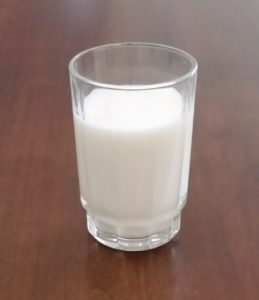 It's good to eat and drink dairy foods! Consuming dairy foods is beneficial for the gut microbiome, but each dairy food - whether milk, cheese, or yogurt - appears to have different effects on the composition of the gut microbiome (the community of bacteria, viruses, fungi).
It's good to eat and drink dairy foods! Consuming dairy foods is beneficial for the gut microbiome, but each dairy food - whether milk, cheese, or yogurt - appears to have different effects on the composition of the gut microbiome (the community of bacteria, viruses, fungi).
A recent small study found that consuming higher amounts of dairy foods is beneficial for the gut microbiome, and resulted in a greater variety of bacterial species (this is considered good for health). There was more abundance of the beneficial bacteria Bifidobacterium, a bacteria associated with digestive health and immune support.
Consumption of milk was especially beneficial in boosting a variety of beneficial bacteria (Faecalibacterium) known for their anti-inflammatory properties.
Higher amounts of total dairy foods consumed was associated with lower levels of Bacteroides, which are linked to inflammatory conditions and colorectal cancer.
Excerpts from news-medical.net: Milk boosts gut-friendly bacteria while cheese alters microbiome balance, study reveals
In a recent study published in the journal Nutrients, researchers in the United States explored the influence of dairy consumption on colonic mucosa-associated gut microbiota. By investigating specific bacterial composition changes linked to dairy intake, they highlighted its implications for individual and public health.
A cross-sectional study was conducted with 34 participants who had undergone a colonoscopy at the Michael E. DeBakey Veterans Affairs Medical Center in Houston, Texas. ...Colonic mucosal biopsies were collected and analyzed for microbial composition using 16S ribosomal Ribonucleic acid (rRNA) gene sequencing. ...The study included a total of 97 mucosal biopsies from these participants.
Study results: Bifidobacterium linked to total dairy intake: Participants who consumed more total dairy (not just milk) showed a higher abundance of Bifidobacterium, a well-known probiotic associated with digestive health and immune support.
Higher consumption of total dairy and milk was associated with increased microbial alpha-diversity, indicating greater bacterial richness and evenness. In contrast, higher cheese consumption was linked to lower microbial diversity. Beta-diversity analysis revealed significant differences in gut bacterial composition based on dairy intake levels.
Participants who consumed more dairy and milk exhibited a higher relative abundance of Faecalibacterium, a bacterium known for its anti-inflammatory properties. Increased milk intake was also associated with greater levels of Akkermansia, a mucin-degrading bacterium linked to improved gut barrier function and metabolic health.
Conversely, higher cheese consumption correlated with a lower relative abundance of Bacteroides and Subdoligranulum. While Bacteroides have been implicated in colorectal cancer (CRC), lower levels of Subdoligranulum have been linked to metabolic disorders. Additionally, the study found that higher total dairy intake was negatively associated with Bacteroides, suggesting a complex relationship between dairy components and microbial composition.
The study did not find significant associations between yogurt intake and microbial composition, likely due to low yogurt consumption among participants. The findings suggest that different dairy products exert varying influences on gut microbiota, which may have implications for dietary recommendations and gut health interventions.
To summarize, dairy consumption significantly influences the composition and diversity of colonic mucosa-associated gut microbiota, with potential implications for individual and public health. A higher intake of total dairy and milk promotes beneficial bacteria such as Faecalibacterium and Akkermansia, whereas higher cheese consumption is linked to reductions in Bacteroides and Subdoligranulum. Notably, total dairy intake was inversely associated with Bacteroides, a genus linked to both colorectal cancer and inflammatory conditions. These findings underscore the broader impact of dairy consumption on gut health, which in turn affects metabolic, immune, and digestive functions.
